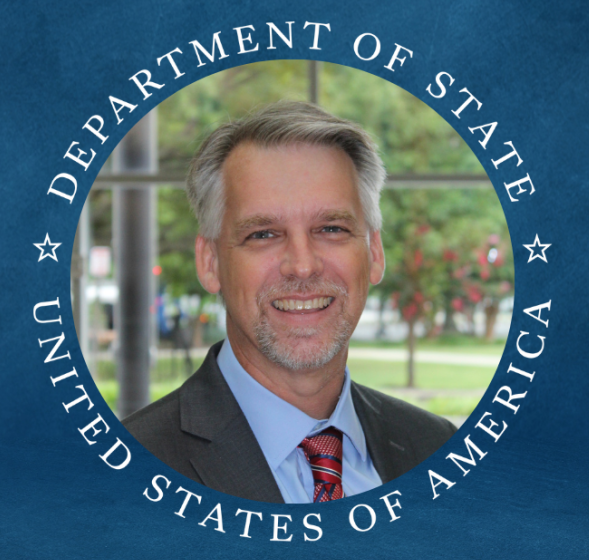
After two decades of foreign service, Shane Hough was named Tulane University’s new Diplomat in Residence this summer. In this position, Hough is responsible for recruiting the future generation of Department of State employees.
The Diplomat in Residence provides students and professionals with guidance about potential careers, internships and fellowships with the Department of State. Although he is based at Tulane, as the DIR for the Central South region, he engages with campuses all throughout Louisiana, Mississippi, Arkansas and Oklahoma.
Hough grew up in Holly Ridge, Louisiana. About every three years, the Department of State gives select officers the opportunity to bid on their next positions. There are only 17 Diplomats in Residence positions, so when he heard about Tulane’s, Hough said he was excited at the idea of working close to home.
Hough would go on to serve four years of Louisiana State Civil Service and more than 17 years in the Foreign Service, where he was stationed abroad in Ecuador, El Salvador, Guatemala, Paraguay and Honduras.
But it was not until his time in the Peace Corps in Tanzania as a volunteer teacher in the 1990s that Hough became aware of the Foreign Service.
“After landing in Tanzania, we were given this security briefing by the regional security officer from the embassy,” Hough said. “I knew that we had embassies overseas, I just didn’t know that my career could take me to one of those places in the future.”
Before joining the Peace Corps, Hough graduated from Louisiana Tech University and then worked as an engineer for about three years. After returning from the Peace Corps, he went to American University in Washington D.C. and enrolled in the School of International Service.
Hough said that foreign officers’ career trajectories tend to vary tremendously.
“It takes a whole diverse group of people to make up the Foreign Service,” Hough said. “I’m a mechanical engineer, but we don’t need a Foreign Service full of mechanical engineers. We also need art historians, architects, international relations and political science folks.”
Because of the range of talents drawn to the U.S. Department of State, Hough said there are very few limitations on who should join.
“You really do need to enjoy living abroad and … getting outside your comfort zone from time to time,” Hough said.
As a foreign service officer, Hough chose to be an economic officer. Outside of his usual work dealing with problems concerning international trade, Hough said he gets a special sense of gratification from the work he does with the Environment, Science, Technology, and Health Office because of the direct impact on people’s lives.
“You and I, in particular, after surviving this summer in New Orleans, we understand the impact of climate change,” Hough said.
Hough said one of his favorite experiences of his career was when he was able to join a survey flight over the western Petén to document non-governmental organization progress in preventing illegal logging and reforesting large swathes of the jungle along the Mexico-Guatemala border.
That work, Hough said, was “one of the most impactful and overlooked ways that the Foreign Service firstly delivers benefits for the American people, but also seeks to make life better for other people around the world.”
One piece of advice Hough has for Tulane students is to go for every opportunity out there.
“To really maximize your opportunities, you have to know what’s out there first,” Hough said. “Then just go for anything that is appealing to you, because you really never know what is going to pan out in the end.”
Hough recommends that students check out U.S. Department of State Careers page to explore opportunities open to both undergraduate and graduate students. Students can also set up individual meetings with Hough through Handshake. Hough is on campus every Friday around 1:00 p.m.



Leave a Comment